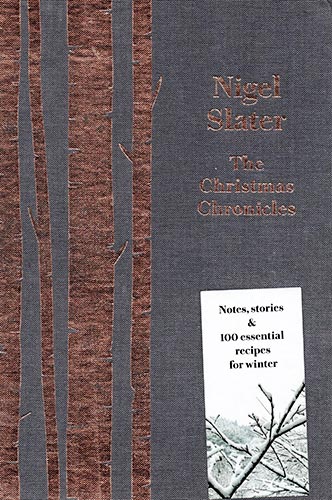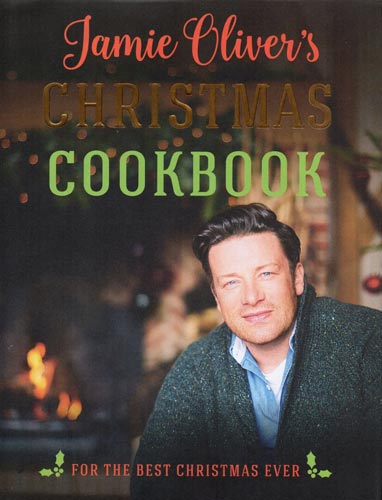Two British cookbooks for wintertime: Buy them both.
Christmas is an altogether different phenomenon in Britain than in the United States. No November Thanksgiving is celebrated along the North Sea so in part Christmas doubles down as feast day.
The rounds of revelry also are more depraved in the United Kingdom than in the United States. Office parties beget office parties and it sometimes seems that anyone invited to one of them gets an invitation to all of them. Often these are unabashedly boozed up affairs that lead to all kinds of things including affairs. Sin is a lot more constructive than piety so the fallout is fine.
More generally the season celebrates adult pleasures along with childhood magic to an extent also atypical of America. Less work gets done during the runup to the day in the UK and the British get a second, Boxing, Day off as well, for sharing presents, nursing hangovers and devouring the leftover turkey and ham sliced cold or, perhaps in the case of the turkey, devilled in various ingeniously irresistible ways. These all are good things.
Two more good things are new books for the season from Nigel Slater and Jamie Oliver, two towering figures with contrapuntal reputations in the world of British foodways.
Slater is neither the most popular (they come and go fast as fashion will dictate while he, like the Dude, abides) or approachable in terms of everyman or the expanding horde of people with scant attention spans. With some justification, however, he may be the most admired British writer on food today. Instead of following conventional form to produce embellished recipe listicles, Slater writes to be read, for contemplation as much as instruction, and is good company for those with the patience to join him.
According to Florence Fabricant, his Christmas Chronicles represents “The Decoding of an English Christmas” but as often is the case she is not quite right. The book is mistitled, a result perhaps of marketing prerogatives. Slater likes the winter months and while he does consider Christmas a highlight, it is November and then the season itself that he chronicles, and not in England alone. Slater goes to Gothenburg, Nuremburg, Tyrolia, Cologne, magical manifestations of Christmas.

The second half of the title is accurate: The book in fact is a diary, the format he has chosen over the last few titles and years.
It starts with the proverbial bang. Describing the onset of cold:
“The icy prickle across your face as you walk out in to the freezing air. The piercing burn to your sinuses, like wasabi. Your eyes sparkle, your ears tingle. The rush of cold to your head is stimulating, vital, energising.” (Slater 1)
A simile in the hand of a lesser writer can clunk but the allusion to flavor catches that first shock of cold. The passage is a tough act to follow but Slater follows through. It is 11 December in the Slater household and they have begun to trim the tree. It is, he is happy to say,
“one of those activities, like baking bread, that allows us to do other jobs at the same time, and I often take a day or two to complete the job. This year is no different.”
It does not matter that the job has only begun: “Today feels something of a celebration, so we open a bottle of Champagne, making Christmas somehow official.” (Slater 244) Slater has given this house a new fizzy tradition.
Slater is no hagiographer of Christmas. The season spurs memories, and he has a lot of bad ones. The Chronicles is tinged with melancholy. Slater refers with disciplined understatement to the “unhappy adolescent home” he had described in brave detail with Toast-the story of a boy’s hunger. (Slater 9) His beloved mother kills herself when he is nine; his father, cold and cruel, then marries a harridan who resents Slater’s existence and torments him, screaming about imagined misdeeds to her husband each night. The boy somehow survives, fortified by his devotion to cooking and masturbation. On moving to London as an adult he loses everything in a housefire.
None of the sad asides renders the Chronicles lugubrious. They and Slater’s judgment do render it compelling and humane. He likes fruitcake (he bakes it himself), ghost stories with sloe gin, pig’s cheek and prune terrine. He dislikes the right things too, like mulled wine redolent of “cheap pot pourri:” “Most of the things designed to make our houses smell festive are uniformly nauseous” but not, “of course,” the tree. (Slater 19)
Christmas may be a highlight but Slater himself does not allow a letdown for the colder months that follow. His attitude contradicts the conventional wisdom he describes. “To read the press,” he explains as shorthand for media more generally,
“post-Christmas dinners are supposed to be different. A casting off, a release from relentlessly rich and sweet festive fodder. Food that will take us from sloths lying imprisoned by our own greed on cushioned sofas to being energy-packed titans of the gym.”
This is a cook who can write. Slater would be the Elizabeth David of our time but only if David were nearly as good as her misguided acolytes insist.
“I never,” he announces in defiant response to the winter ascetics, “have changed what I eat just because I have opened the last window on the advent calendar.” Good for him. “Yes,” he continues,
“there is a slight change of step, a tweaking of our everyday eating, but that is to do with the shifting seasons. It is neither an act of repentance for food enjoyed nor a desire to change our lives.” (Slater 413)
Words, as they say, to live by. His recipes, with few exceptions, are exceptional, ornaments placed throughout a moving meditation on winter.
Oliver is considerably less admired by the aesthete, the luvvie and the snob. He has taken heat for his endorsement of a supermarket chain that peddles factory food and has been mocked for his various charitable endeavors which, however, have been well intentioned and have done some good.

If Slater is reflective, reserved and cerebral, Oliver is voluble and populist, an unbound Id of the kitchen. He exudes confidence and, unusually for him, condescension on the assumption that like Thanksgiving in America, Christmas is an occasion of culinary stress in Britain. Does anyone, however, need to be told in “A little pep talk” to “look out for seasonal offers” or lack the insight to comprehend that “[b]uying online can be helpful, too, as it saves you carting around heavy items?” (Oliver 12)
The risible list of over fifty essential kitchen implements includes both colander and sieve, incongruous in terms of Christmas muffin and cupcake pans, two pairs of redundancies, the mandolin nobody uses and, for the dimmest of wits, plastic wrap. These tips and the pep talk taste a lot like filler.
No melancholy, not ever, infiltrates a page of his enormous output, a manic total of eighteen other books. Like them all, Jamie Oliver’s Christmas Cookbook sounds like he dictated it in an amphetamine frenzy and its subtitle, For The Best Christmas Ever, is typically over the top. So is the overfamiliar prose with its exclamatory superlatives.
Adjectives spatter the text, birdshot across a body. Repeat offenders include “amazing,” “awesome,” “incredible,” “loads” (as in “loads of happy memories”), “lovely,” “massive” (as in “a massive Oliver family favorite”) (Oliver 68, 256), “scrumptious,” “super” and many others.
Unlike the Chronicles, the Christmas Cookbook is essentially a collection of recipes, some related to the holiday or at least to winter, others included on an arbitrary basis. While Slater’s recipes are calm and casual in outline, Oliver does not assume that his reader has any competence whatsoever in the kitchen, so it is perhaps the better book for beginners or the uncomfortable cooks.
The Christmas Cookbook harbors some infelicities. “Gone are the days,” according to Oliver, “of regular bread sauce.” (Oliver 156) is wrong about bread sauce, about bread sauce in this house and the House of Slater anyway. Slater likes “that moment when… roast chicken nudges a pool of nutmeg scented bread sauce,” (Slater 244) and who was it had the genius to note that the whole point of roast chicken is bread sauce? Oliver’s ‘replacement’ for that best of sauces for birds is nothing of the sort, misnamed in the manner of the Chronicles.
“Baked Bread Sauce” is a silly name for what he accurately describes as “a savoury bread and butter pudding” but it is neither as “awesome” nor innovative as he claims. Why, why resort to 2% milk? Lagasse offers a better version in his own collection of Christmas recipes, one of those surprising but not uncommon instances where the food of Louisiana incorporates English antecedents, and as a bonus he puts mushrooms into his own savory pudding; whole milk as well.
Why, then, bother with anything Oliver?
Elsewhere he comes through. The chapter of starters is strong. A ‘Smoked Salmon Pate” is no such thing but rather a combination of the salmon with crab, shrimp and salmon round bound in cream cheese brightened with lemon. A simple smooth chicken liver terrine is as it should be, the gravlax cured with beets and horseradish looks and tastes unimpeachable.
Oliver has a decent enough gravy for the benighted vegans among us: Marmite is the key. There is a winter kedgeree for the ages. Oliver adds fresh chilies, fennel seed and leftover greens to the classic, nothing revolutionary but something nice for the colder months. Turkey roasted beneath a lattice of bacon goes far to solve the perennial problem of dry breast meat and the illustrated guide to carving the bird is a good one. His goose, however, could do without the Chinese spice and cinnamon.
A chapter devoted to leftovers is most welcome. Some of the recipes are appealing enough to tempt a cook to create the leftovers just for them.
Finally, in his ridiculous way Oliver is fun. Suspend the critical faculties or only take a break from the cynicism required to survive these days and revel in the silly celebration that is his Christmas Cookbook.
Sources:
Florence Fabricant, “The Decoding of an English Christmas,” The New York Times (12 December 2018)
Jamie Oliver, Jamie Oliver’s Christmas Cookbook (New York 2017)
Nigel Slater, The Christmas Chronicles (London 2017)
Toast-The story of a boy’s hunger (London 2005)

